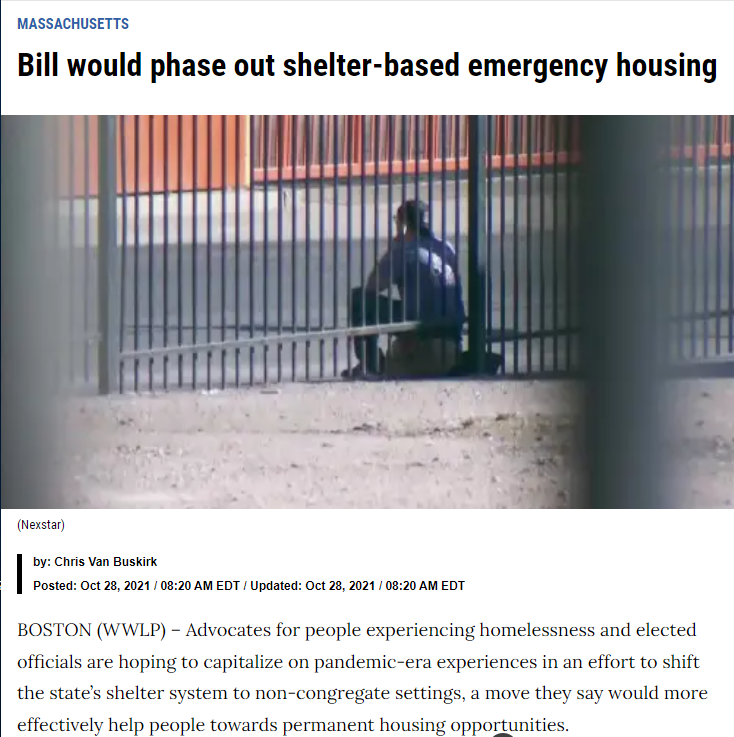|
During a Housing Committee hearing Tuesday, Rep. Natalie Higgins pushed House and Senate colleagues to advance legislation (H 3959) that seeks over a five-year period to end the use of congregate shelters by the Department of Housing and Community Development and create plans to streamline housing services.
“I come at it from a trauma background. I spent 10 years as a rape crisis counselor. For so many of my community members, going to a massive shelter is not a safe place, and they were choosing to stay on the streets,” the Leominster Democrat told the News Service after the hearing. Check out the full article: https://www.wwlp.com/news/massachusetts/bill-would-phase-out-shelter-based-emergency-housing/
8 Comments
Growing up in a Gateway City, I’m thankful I can be the proud homeowner of my great-grandparents’ home. With that long family history also means challenges of owning a home from 1920. Recognizing those challenges for households across the state, I am teaming up with Environment Massachusetts and the Massachusetts Climate Action Network, along with Rep. Michael Kushmerek (Fitchburg) and Sen. Brendan Crighton (Lynn) on new legislation: The GREEN Act: Gateway Cities Renewable, Efficient, and Electrified Neighborhoods (H3320/S2152).
If you’re not familiar with the term, a Gateway City is defined in state law as a city with a population between 35,000 and 250,000, with an average household income below the state average, and an average educational attainment rate (bachelor’s degree or above) below the state average. Leominster and Fitchburg are both Gateway Cities. Many houses and apartments in Gateway Cities were built more than a century ago. These buildings often use energy inefficiently, due to a lack of insulation, old appliances, and outdated lighting fixtures. Most homes burn oil or gas for heating, and residents — particularly low- and moderate-income families — may lack the opportunity to switch to cleaner alternatives. With the right support and incentives, houses and apartments can be retrofitted to be efficient, fossil-fuel-free, and powered with renewable electricity. The result will be cleaner, healthier, and safer communities for all. Gateway Cities, as well as smaller communities with similar demographics, have an important role to play in the statewide transition to 100% renewable energy. The GREEN Act will bring together residents, building owners, community organizations, and municipal and state officials to create solutions for energy-efficient, pollution-free homes. Through innovative action at the local level, these communities can lead the Commonwealth toward a greener future. The GREEN Act will establish a new program to retrofit low- and moderate-income housing in Gateway Cities and in smaller communities with similar demographics. Phase 1 of the GREEN Initiative will fund at least one project in each Gateway City and an additional ten projects in smaller communities each year, focusing on naturally occurring affordable housing units. Each project will retrofit at least 10 housing units to be highly efficient, use clean heating and cooking technologies, and, where possible, be powered with energy from rooftop solar panels. Local governments and nonprofit organizations will oversee the projects and share the results with the broader community. The GREEN Initiative will provide additional incentives and technical support to assist with retrofits, in coordination with existing state and utility programs. After two years, the Department of Energy Resources will collect data on the results of Phase 1 and identify the most effective retrofit approaches for each housing type. DOER will convene an interagency task force to design and oversee Phase 2 of the GREEN Initiative, which will continue for at least eight more years. https://www.leominsterchamp.com/story/opinion/columns/2021/10/26/going-green-bill-would-retrofit-older-homes-gateway-cities/8540938002/ YES
Natalie Higgins State representative, Leominster Democrat, former executive director of Public Higher Education Network of Massachusetts I am a proud first-generation college student, and graduate of UMass Amherst. My younger brother earned his associate’s degree from MassBay Community College. Thanks to our parents’ dedication to make sure we had more opportunities than they had, we earned our degrees without taking on student debt. Our story is not the norm. The average graduate in Massachusetts is left with a student loan burden of $33,256. Graduates in Massachusetts who attended a public institution are more likely to incur student debt, and in higher amounts relative to their college costs, than those who attended private ones. The average student debt grew faster in Massachusetts than in all but one other state from 2004-2016, and more than 855,000 Massachusetts residents owe student debt. Debt-free public higher education was a reality for the majority of Massachusetts students as late as 1988 (the year I was born), when the MassGrant covered 80 percent of tuition and fees at public institutions. Today, the maximum MassGrant covers less than 14 percent of tuition and fees at UMass Amherst. And higher education funding has not recovered since sharp cuts in 2001, with per student funding down 32 percent and student scholarships also dropping 32 percent between 2001-2018. A UMass Amherst student has to work more than 23 hours per week, just to cover tuition and mandatory fees, never mind the other costs of attendance, such as housing, food, textbooks, and transportation. Just adding room and board brings that to 44 hours each week. Debt-free public higher education is an important investment in our communities. Among Massachusetts high school graduates who attend college, 62.6 percent choose a public college or university. Ninety percent of public higher education graduates stay in Massachusetts, according to 2014 figures. This is also an equity issue. While more than 43 percent of Massachusetts residents hold a bachelor’s degree, many Gateway Cities have college completion rates half that, including Brockton, Fall River, Fitchburg, and Lawrence. Massachusetts is home to one of the nation’s highest-paid workforces because of college attainment, and we need to ensure Massachusetts residents in low-income communities and communities of color have that same access. Read the full article: https://www.bostonglobe.com/2021/10/22/metro/should-massachusetts-public-colleges-universities-be-tuition-free/ |
Archives
May 2022
Categories |


 RSS Feed
RSS Feed